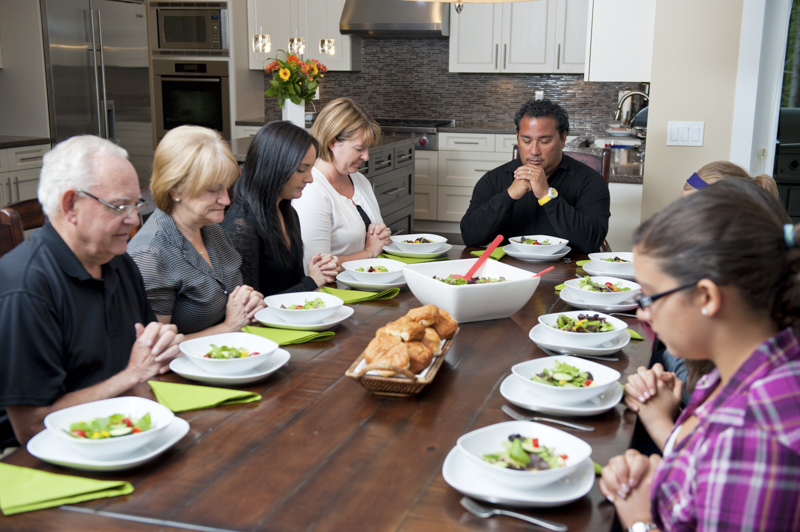by Guest Blogger | Jul 21, 2015 | Guest Posts

By Camille Beckstrand, guest writer from SixSistersStuff.com
When I was growing up, family dinner happened every night at 6 pm. In spite of crazy schedules with sports, dance, gymnastics,and school activities, we knew that our mom would have dinner on the table every night at that time. During our meal, we were not allowed to take any phone calls – dinner was a time spent together to talk and eat.
During family dinner, we would discuss the happenings of each day and to talk about the things that were going on in our lives. It was a time to laugh and share funny stories and a time to talk about serious current events. Many of my favorite memories happened around the dinner table and helped shape me into the person that I am today.
When my sisters and I started our blog SixSistersStuff.com, we shared many of our favorite family recipes and we soon realized that one of the reasons we loved these recipes so much were because of the many memories and traditions associated with them. As our following grew, we started to get emails and comments from readers who would tell us that family dinner was a rare occurrence in their home – for many, Christmas and Thanksgiving were the only times that their family gathered around the table to enjoy a meal together.
My sisters and I couldn’t believe what we were hearing! It seemed to be that family dinner was a old tradition that was quickly being forgotten. We decided that it was important to start sharing why we were so passionate about family dinner and invite others to experience the benefits that eating together can have on your children, your relationships, and your overall happiness.
We did some research and found a couple of studies on family dinner that had mind-blowing data. Who knew that family dinner was such a powerful thing? Here are a couple of statistics about dinner that we learned:
-Family dinner will help children get better grades in school.
-By having family dinner together, there is a lower chance of children experimenting with smoking, drinking, or other drugs.
-Family dinner can also help lower depressive symptoms and suicidal thoughts during the teen years.
-Family dinner has been proven to help with a child’s vocabulary development even more than playtime or story time.
-By eating family dinner together, adolescent girls will have a smaller chance of developing an eating disorder.
-Children that have dinner with their family on a consistent basis will be less picky and be more willing to try new foods.
-Family dinner has shown to help lower stress in adults.
It just blew us away that something as simple as eating dinner with your family each day (or as often as you can) would have such an impact on your family and their lives!
To help promote the idea of family dinner, my sisters and I launched the 4×4 Dinner Challenge. We challenged our readers to eat dinner with their family at least 4 times a week for 4 weeks straight. Thousands of people around the world took on the challenge. We shared ideas on how to make dinner a success by giving them easy family-friendly recipes, dinnertime conversation topics, and ways to include the family on the preparation of the food. We asked our readers to share with us their experience, whether good or bad, and the responses came pouring in. The responses that stood out the most to us were from families who had never had dinner together; the ones who did not know how to talk to their children when they did finally sit down together because family dinner and conversation was something completely foreign to them.
At the conclusion of the 4 week challenge, we invited our readers to join us in the “Family Dinner Around The World”. On the day chosen for the worldwide family dinner, we asked our readers to eat dinner with their family at 6 pm and share a photo on Instagram, Facebook, or Twitter so that others could see it and we could track the different dinners around the world. We also had a sign-up page on our blog where people could put in their location and a little pinpoint would appear on the map so that we could see where they were located. We literally had people sign up from every country in the world and in every time-zone. It was so fun to watch the pictures roll in all day long- families in Australia, India, Sweden . . . the pictures just kept coming! Families across the world were sitting down together and making memories, strengthening their families, talking to each other, and of course, enjoying their food.
I know that sometimes the smallest things in life can make the biggest difference and I firmly believe that family dinner is one of them. If you are looking for a way to strengthen your family, a way to have better relationships with your children, or a way to keep the doors of communication open with each other, I know that family dinner will provide the way to do that. I invite you to take the Family Dinner Challenge – eat dinner 4 times a week for 4 weeks – and see if you notice any changes.
Camille Beckstrand
SixSistersStuff.com
by Guest Blogger | Jul 2, 2015 | Guest Posts

By Celeste (guest writer from athingcalledloveblog.com)
Last Thursday I had kind of a rough day with the kids. I was tired from staying up a little too late and the kids’ energy was just doing me in. It was one of those days when I was counting down the minutes to 5:45 pm when my knight in shining armor would come rescue me and my sanity.
The only problem was when he came home from work, he was tired too. Funny how that works. So, instead of relieving me by coming home, playing a couple of rounds of UNO with the kids, making dinner, folding the laundry and feeding me grapes (as I wistfully imagined the scene playing out), he instead came home, got on the computer and relaxed.
I was miffed. I let my miffed-ness bleed into my interactions with him that night, into the next day and even the next (without telling him why of course), which then had the effect of spreading my grumps to him. We were off for a few days.
Now let me preface this by saying that I believe in forgiveness. I really do. I believe in its power. I believe that in just about every conceivable situation of hurt, forgiveness is the route that will bring the most peace. Why then is it so easy for me to see that if the people around me would just forgive their spouse/co-worker/mother-in-law they would be so much happier, and at the same time so easy for me to forget the principle entirely when I’m bothered by something?
Funny how that works.
I’ve been doing a lot of thinking about forgiveness lately and I’m becoming more and more convinced I need to do some major construction work on my life in the area of forgiveness. I’ve been reading Forgive For Love by Fred Luskin, a professor at Stanford, who started The Stanford Forgiveness Project. The book has been completely eye opening to me. It feels like Fred is looking me in the eye, telling me all the reasons I don’t forgive and how to overcome those roadblocks.
Generally when I’m hurt or bothered by the actions of others and the idea of forgiveness crosses my mind, some other less-desirable part of my mind comes back with lots of “yes, but”s. I have a feeling most of my roadblocks to forgiveness are some of yours too, so let’s de-bunk them together shall we?
Yes, But What They Did Was Wrong!
True. This can be true. This is often true. Now here’s the crazy thing about forgiving someone who is wrong: that doesn’t matter! You can forgive them anyway!! You can! I can too!
And doing so is the key to happiness in marriage. Learning to let things go even when they bother you, even when you don’t get your way is so so crucial if you want a healthy marriage. (And if you’re aiming for an unhealthy marriage, by all means hold onto those grudges, let all the little things your spouse does that bothers you eat at you day by day. You’re well on your way to an unhealthy marriage already!)
Let’s revisit that situation I described above first through the unforgiving lens and then through a forgiving one.
Situation: Spouse gets on the computer instead of helping with the kids/house.
Unforgiving: Would it have been better if they had not done this? Yes, absolutely. Am I mad about it? Yes! I clean and watch the kids all day everyday! The least he could do is to help out when he’s home!
Forgiving: Would it have been better if they had not done this? Yes, absolutely. Am I mad about it? Nope. He works the same hours I do, just at a different job. He has a right to be tired when he comes home, same as me.
See? If I had just forgiven him his very understandable human error right away then I would have been in such a better mood that night and the next couple of days. It would have brought me peace. My dear husband also would have benefited. Our marriage, our kids and our whole household would have benefited.
Yes, But I Don’t Want to Be a Doormat!
So does forgiveness mean we just have to keep our mouths shut tight every time we’re bothered by our spouse’s behavior? No. Does it mean we have to put up with mistreatment or abuse? Certainly not.
Dr. Luskin says that when we feel mistreated we need to decide if it is a “champagne issue.” Many times in life we get caught up in “champagne” issues. He explains that, for example, we get invited to a wedding or a party and we’re bothered that the champagne is too cold or too fizzy or too old or too strong or not strong enough (Note: never having had champagne I can only assume these things would be bothersome). When really, we should be grateful that there is champagne! That we’re at a wedding! That we’re healthy enough to drink champagne! Or that we have friends who know we don’t drink champagne and provide sparkling cider! 🙂
So when we encounter mistreatment, first we must ask ourselves, is this a champagne issue? If it is, let it go. Forgive your spouse their weakness of being human. If, however, it is a bigger issue, then we need to address it with our spouse. (and then still forgive!)
It’s been my experience that addressing these issues at the right time and in the right place is key. We hold a weekly companionship inventory where we first pray, then compliment each other, THEN discuss more difficult issues. This has been so important to set the right tone for hard conversations. Read more about companionship inventory here.
So, with my example of a spouse being online too much- if it’s a one time or sometimes thing- let it go. If it’s everyday all the time, discuss it and try to resolve it together. And then still forgive!
Yes, But What They Did Was REALLY Wrong!
If you’re confronting serious mistreatment, you may need to seek professional help. You will probably need some time to grieve and confront your own emotions. You may need to get out of the relationship. But even then, forgiveness is key to your long-term emotional well-being and happiness. A study on mental health after divorce found that divorced persons who were working toward forgiving their ex-spouse were less likely to be depressed, feel anger or act out in anger than those who were not working toward forgiveness.
So, let’s conclude with a little pop quiz so we can remember what we’ve learned. I know that you could just glance down to the answer key and cheat. And even if you do … I’ll forgive you.
Forgiveness Quiz:
- True or false: Forgiveness means condoning the offender’s actions.
- True or false: Forgiveness means you should not hold your spouse accountable for the quality of your relationship.
- True or false: The quality of my marriage is directly related to my ability to forgive quickly and easily.
- True or false: You are the biggest beneficiary when you forgive others.
- True or false: Forgiving others is hard, but I can do hard things.
Answer key: 1. False 2. False! 3. True. 4. True! 5. True!! TRUE!!!!






